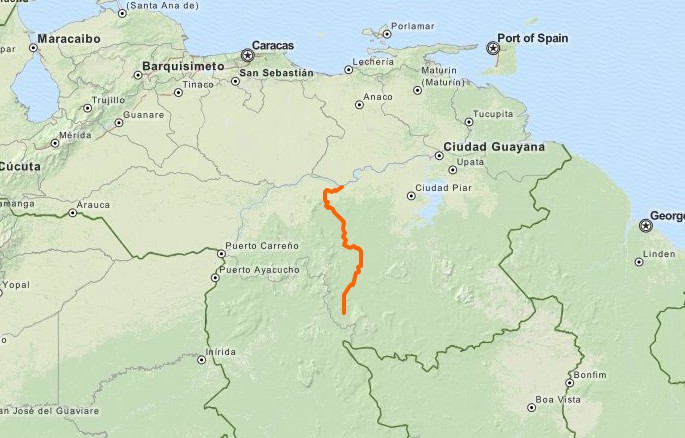
In the watershed between the Orinoco and Amazon Rivers in Venezuela, lies the Caura River basin. As Mongabay has reported, the Caura Basin is characterized by lowland tropical rainforest, and has remarkable levels of biological diversity. It also stores some 700 million metric tons of carbon, roughly the same amount released by 162 million cars each year.
The Caura Basin is also home to the Ye’kwana and Sanema Indigenous Peoples. There, the Ye’kwana live in huge conical collective dwellings while maintaining a strongly developed tradition of shifting agriculture. They have lived in the area at least as long as historical records recount. The Sanema (Northern Yanomami), a more mobile group of hunters, gatherers and budding agriculturalists, were pushed into the area from the south about a hundred years ago.
A report from the Forest Peoples Programme discusses how these Indigenous Peoples have mobilized and organized themselves in the last decade or more to claim their rights and to protect the biological resources of their lands and territories. They have created a radio network; established a multi-ethnic, basin-wide Indigenous association; mapped their customary land use system; registered their knowledge as their own intellectual property and became the first ethnic group to apply for legal title under the new laws of Venezuela. Additionally, they have trained community members as ‘para-biologists’; carried out community-level workshops to review their customary institutions; called for the co-management of the existing protected areas; and built up their own institutional capacity, focused on improved interethnic relations and the empowerment of Indigenous women.
However, they are facing (and have been for years) the incursion of armed groups in their lands. These armed groups are there to protect illegal foreign diamond and gold miners in the area. This is an area which the Government long ago agreed would be set aside for the use of the tribes.
The Centro de Investigaciones Ecológicas de Venezuela (CIEV) has been documenting this situation of illegal mining and armed groups and according to co-Director José Figueroa “illegal mining in the Upper Caura has now reached its maximum… with more than three thousand miners destroying the forests”. Figueroa goes on to explain in a press statement [ES] that illegal trails have been cut into the headwaters and clandestine airstrips have been created to accommodate Cessna and Antonov planes which supply the mines with food, drink and fuel.
The mines have also proliferated widespread drug use and prostitution. Additionally, Indigenous Ye’kwena and Sanema leaders have received death threats when attempting to vocalize their opposition to the mining.
Research completed in April of 2013 by Venezuelan scientific research bodies showed that 92% of Ye’kwena and Sanema women of the Caura River have levels of mercury in their bodies that exceed the maximum limit accepted internationally. The ongoing contamination of the rivers of Ye’kwena and Sanema lands is directly caused by the illegal mining and poses a growing risk to the Indigenous Peoples who rely heavily upon local rivers for drinking water, food, and transportation.
CIEV has stated that they are going to the National Assembly and to the Ministry of Defense to promote strategies for territorial sovereignty for the Indigenous tribes, for disarming the groups protecting the illegal foreign miners, for eliminating the illegal mining activities, and to help secure further respect for the rights of the Indigenous Peoples.
The Ye’kwana and Sanema peoples have been struggling for the eviction of these illegal miners for over a decade. Recognizing that the Constitution of the Bolivarian Republic of Venezuela guarantees the secure lands and territories of the Indigenous Peoples, otherwise known in Venezuelan law as ‘habitats’,
the Ye’kwana and Sanema initiated lands claims in the 1990s. However, their claims have remained unrecognized without a Presidential signature despite the Ye’kwana and Sanema going through all the required legal obstacles, including obtaining a final sign off from the Attorney General.
The process of gaining title to their lands began for the Ye’kwana and Sanema with the mapping of their territory. A trained team of Ye’kwana and Sanema visited every settlement and canoed and trekked to every area of significance in their domain.
Entering into another phase of their project for the protection of their land and rights, guidelines for a ‘management plan’ were developed in 2013. This management plan is based on self-run community-level workshops to establish the customary system of resource management to be complimented with Western ideas of resource management through the training of eight community members at the Universidad Nacional Experimental de Guayana in the biological sciences.
The authors of the management plan guidelines have stated:
“As Ye’kwana and Sanema indigenous peoples who live in the Caura River basin, we have developed this Management Plan in order to reflect on our future development and on the necessary activities needed to ensure that our future is sustainable. With this work, we are preparing the way for when land titles are granted for the lands that we occupy in the Caura basin in order that we will have the capability to manage our resources in the best way possible, and so that we have a clear vision of the actions that we should take to benefit our inhabitants now and in the future.”
The recent report from CIEV highlights the need for the government of Venezuela to uphold its Constitution and laws regarding the rights of Indigenous Peoples by expelling the miners, and protecting the Indigenous Ye’kwana and Sanema Peoples.

Indigenous Peoples are putting their bodies on the line and it's our responsibility to make sure you know why. That takes time, expertise and resources - and we're up against a constant tide of misinformation and distorted coverage. By supporting IC you're empowering the kind of journalism we need, at the moment we need it most.